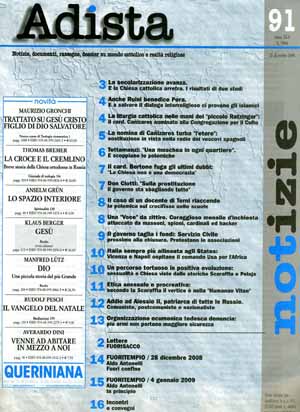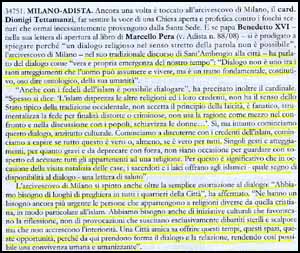The Cardinal Archbishop of Milan, Dionigi Tettamanzi, issued the following statement on how dialogue with Islam should be carried out in his city in December of 2008.
At right, the cover of the weekly ADISTA magazine (Rome), where the news was reported. Below right, the Italian text; below left, our translation of the text highlighted in yellow.
In his traditional St. Ambrose address to the city, Card. Dionigi Tettamanzi, Archbishop of Milan, spoke about dialogue as "a true and appropriate characteristic of our times. Dialogue is not just one among many positions that man may take and live with, but a fundamental, constitutive and ontological trait of mankind."
The Cardinal added, "Even with the faithful of Islam it is possible to dialogue. It is often said, 'Islam despises other religions and their believers. It has a different notion of State from that of the Western tradition; it doesn't accept the lay principle; it is fanatical; it manipulates the faith to serve twisted or criminal purposes; it doesn't use reason in confrontations and discussions with others; it enslaves women...' Yes, nonetheless, we have begun this dialogue - a predominantly cultural one. We have started to enter into discussion with the believers of Islam. We have started to examine whether all these things are true - or at least whether they are true for all.
"Personal gestures and attitudes - even when they are grievous and deserve a strong rejection - are not reason enough to suspect and accuse all those who belong to a religion. For this reason, it is important that during Christmas visits to homes, the clergy and laity should offer greeting cards to Muslims as a sign of openness and dialogue."
Beyond the simple exhortation to dialogue, the Archbishop of Milan called for something more: "We need places of [Muslim] prayer in every neighborhood of the city. Persons who belong to religions different from the Christian one - namely, to Islam - have an even more urgent need for these places. We also need cultural initiatives that favor reflection, not provocations that raise sterile debates and resentments and add nothing to the interior life. A friendly city knows how to offer these times, spaces and opportunities, because it is from here that dialogue and relationships sprout, making possible a human and humanizing conviviality."
("Tettamanzi: 'Una Moschea in Ogni Quartiere.' E Scoppiano le Polemiche" in ADISTA, December 20, 2008, p. 6)
|


 |
|

